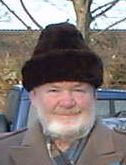Humphry Bowen
| Humphry John Moule Bowen | |
|---|---|

Humphry Bowen in 1999
|
|
| Born |
22 June 1929 Oxford, England |
| Died | 9 August 2001 (aged 72) Dorset, England |
| Nationality | British |
| Fields | Analytical chemistry, botany, lichenology |
| Institutions |
Atomic Energy Research Establishment University of Reading |
| Alma mater | Magdalen College, Oxford |
| Known for | Study of trace elements, Bowen's Kale, two English county floras (Berkshire and Dorset) |
Humphry John Moule Bowen (22 June 1929 – 9 August 2001) was a British botanist and chemist.
Bowen was born in Oxford, son of the chemist Edmund Bowen. He attended the Dragon School, gaining a scholarship to Rugby School and then a demyship to Magdalen College, Oxford. He won the Gibbs Prize in 1949 and completed a DPhil in chemistry at Oxford University in 1953 before starting his professional career as a chemist. Bowen was also a proficient amateur actor in his early years, appearing with a young Ronnie Barker at Oxford.
His first post was with the Atomic Energy Research Establishment (AERE), working at the Wantage Research Laboratory, then in Berkshire. His early work started an interest in radioisotopes and trace elements that he maintained throughout his working life. While at AERE, he spent several months in 1956 attending the British nuclear tests at Maralinga in Australia to study the environmental effects of radiation.
Bowen realized that the calibration of different instruments intended to measure trace elements was an important issue that needed addressing. His solution was to produce a good supply of a material which later become known as Bowen's Kale. With Peter Cawse, he grew a large amount of the plant kale, then dried and crushed it into a homogeneous and stable substance that he then freely distributed to researchers around the world for years to come. This was probably the first successful example of such a standard.
...
Wikipedia
